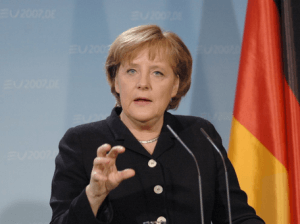Merkel admits slow response to Germany’s second coronavirus wave

Chancellor Angela Merkel admitted to shortcomings in Germany’s response to the second wave of coronavirus infections during a speech to parliament on Thursday.
Germany weathered the first wave of cases at the start of the pandemic comparatively well, Merkel told lawmakers.
“Then we weren’t careful enough or fast enough,” she lamented, adding that the second lockdown, which has been incrementally tightened since November, did not come swiftly enough.
On Wednesday, Merkel and the nation’s 16 state premiers agreed to broadly extend the lockdown measures beyond the middle of this month until March 7.
This means that restaurants, bars, high-street shops, museums and leisure facilities will remain shut.
However, the state administrations have decided to go their own way on reopening schools and kindergartens, a hot-button issue due to the immense pressure the lockdown has placed on families with children.
Schools and kindergartens in most states are planning on opening on February 22, while students in Lower Saxony have already returned to classrooms for alternated teaching, whereas Saxony Anhalt has decided to wait until March for a stepwise opening.
In addition, hairdressers will be allowed to reopen under strict hygiene measures from March 1.
Hair salons were flooded with emails and calls for appointments on Thursday as desperate customers rush to fix their hair.
“Actually every customer wants to come in the first week,” said Harald Esser, president of the national hairdressers’ association. “This is a perspective, we are seeing light at the end of the tunnel.”
“The vast majority of the agreed measures must be consistently maintained,” Merkel said, calling the extension “suitable, necessary and proportionate.”
“Not a single day do I forget what the necessary measures mean for each and every citizen: a temporary severe restriction of freedom never experienced before in the federal republic, heavy personal burden, loneliness, economic worries, existential fears. I won’t forget that for a single day,” Merkel said.
There had been some calls from industry and opposition parties ahead of the lockdown talks for further easing, particularly since infection rates have steadily fallen so far this year.
Christian Lindner, leader of the pro-business Free Democratic Party (FDP), said people expected more of Merkel and the regional leaders due to the huge strain the measures have placed on individuals and businesses.
“These hopes were met with disappointment, because many people expected more than a new haircut,” Lindner said.
Alice Weidel, leader of the far-right Alternative for Germany’s parliamentary group, excoriated the government’s pandemic approach as “unconstitutional,” arguing that the lockdown was going beyond the three months initially planned.
“The collateral damage of your methods of confinement and shutdown is reaching immeasurable heights,” Weidel said, adding that many thousands of businesses and self-employed people were on the brink of financial ruin.
Government officials and experts have repeatedly warned that the case numbers are still not low enough to broadly reopen society and have pointed to the risk posed by more infectious strains of the coronavirus, particular the mutation first seen in Britain, which has spread to Germany.
In her speech to the Bundestag, Merkel said the country must heed scientists’ warnings.
She pointed to a number of European countries experiencing “a dramatic period of increasing infections, with all the disastrous effects on health systems,” as a result of new variants taking hold.
Germany’s pandemic response takes into account the seven-day incidence rate, which measures the number of cases per 100,000 residents over a week.
That figure currently stands at 64.2, after soaring to almost 200 towards the end of last year, according to data from the Robert Koch Institute (RKI) for disease control.
Merkel and the state premiers agreed to a sweeping relaxation in the lockdown only once the rate falls to 35.
However, state governments have been known to go their own way during the pandemic under Germany’s federal system.
So far, over 2.3 million people are known to have caught the novel coronavirus in Germany, 63,635 of whom have died, the RKI said on Thursday.
Source: GNA
